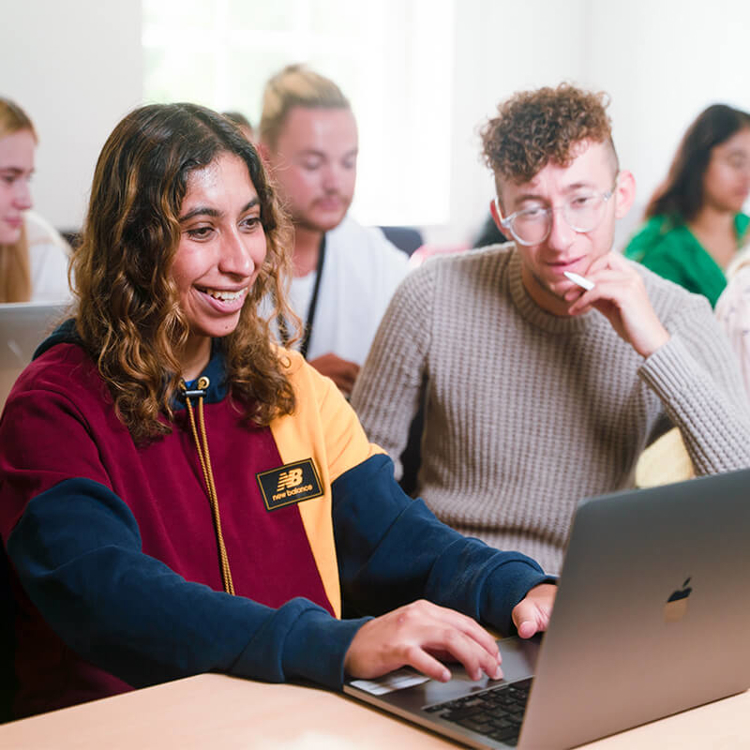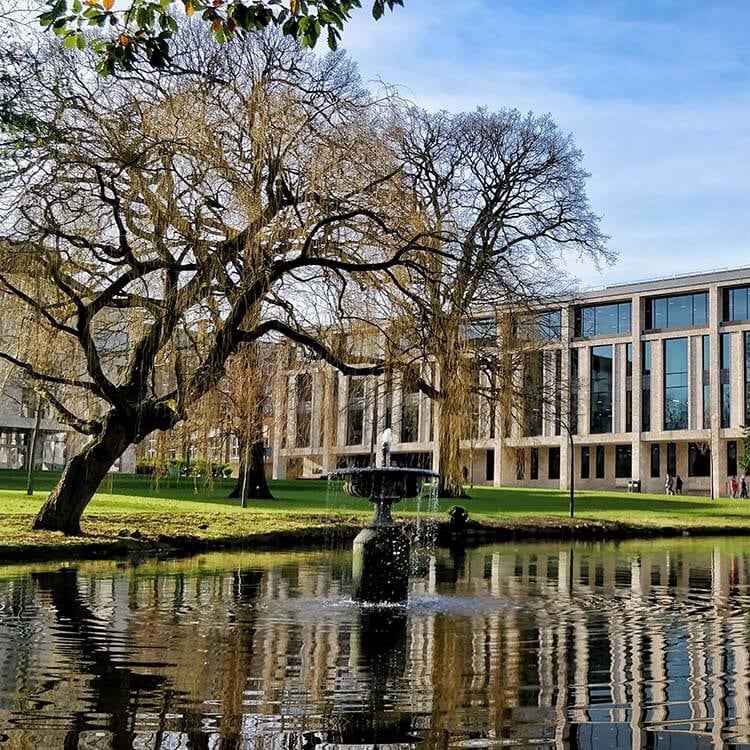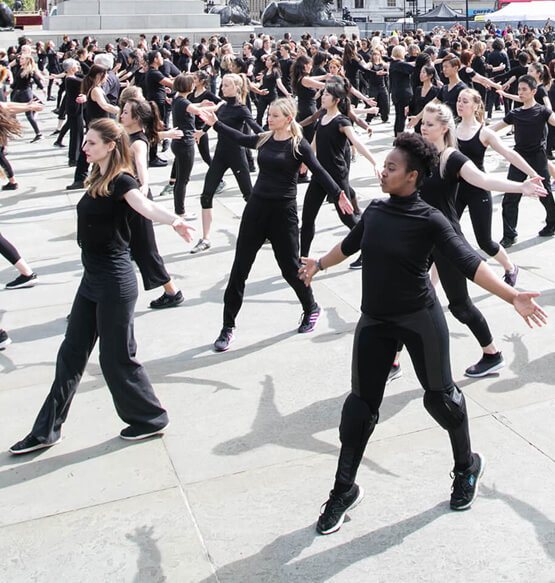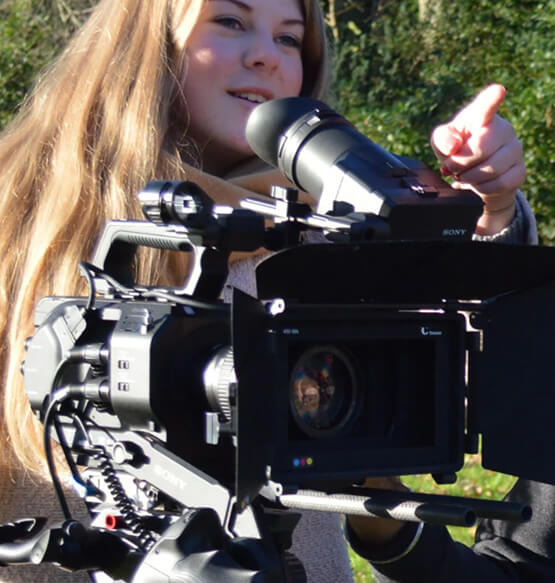Entry tariff:
112–128 UCAS points (or equivalent)
Foundation Year: 64–80 UCAS points (or equivalent)
International Foundation Pathway:
64 UCAS (or equivalent)
IELTS: 5.5
UCAS Code:
PQ53
PQ54 (If choosing Foundation Year)
Start date(s):
September 2026
Dive into the world of literature and journalism become a multi-skilled content creator. This course will teach you how to read critically, write persuasively, and create content that makes an impact.
You'll graduate with a broad, transferable range of creative, analytical, and professional skills. This incorporates:
- Being a critical reader of texts and refining your professional reading, editing, and writing skills.
- Developing skills in research and analysis, problem-solving, digital content creation, and independent study.
- Producing features, podcasts and magazines, alongside industry professionals.
This degree prepares you for a variety of roles, where you’ll think critically, communicate complex ideas clearly, and engage with diverse audiences - skills that are increasingly valuable in today’s workplace, especially in the age of AI, which demands creative and critical thinkers.
In the top 5 universities in London for English
(Guardian University Guide 2024)
![]()
Our Journalism programme is accredited by the industry professional body, The Professional Publishers Association (PPA).
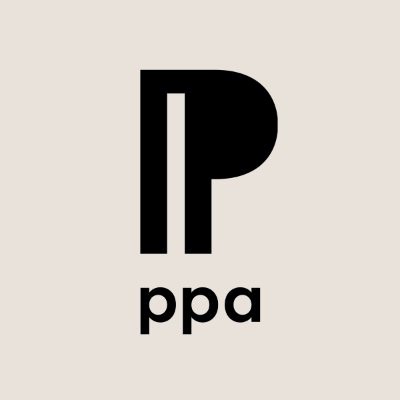
Want to produce your own zine, podcast, or digital portfolio? You’re in the right place.
At Roehampton, you’ll start creating content early on, with expert guidance from professionals. You’ll produce podcasts, features, and, in your final year, a digital magazine or website. One of our previous student-produced magazines even won the prestigious FIPP Rising Star in Media award, beating student magazines from across the globe.
Throughout your journey, you’ll be supported by award-winning magazine editors closely linked to the course.
Modules
Module overview:
Start the journey to becoming journalists and content creators. Guided by professionals, you will learn some of the secrets of the trade. You will discover how to access relevant sources and conduct interviews. You will also start to learn about how journalism works and what it involves.
This module introduces you to the media industry and the culture, traditions and achievements of journalists in Britain and the world. You will also learn to research, prepare and conduct interviews, and select news for the design of a newspaper’s front page.
How you'll learn:
You'll learn through either weekly lectures or workshops and some weeks will have extra small group learning. There will be time for individual tutorials. Lectures will cover the key learning material, key for sustainability, global engagement and professionally focused education.
The sessions will be highly interactive, with frequent class debates on key topics such as the freedom of the press, media ownership and the social and cultural influence of tabloid journalism.
Module overview:
This module introduces you to the degree-level study of English Literature, with a particular focus on literary history and notions of literary value, establishing a dialogue between landmark ‘canonical’ texts and texts written by or representing people marginalised from traditional histories and judgements of literary value (judgements often shaped by power relations based on social class, race and ethnicity, nationality, religion, gender, and/or sexuality). The module will empower you to ask vital questions about literature and literary criticism: Who gets to decide what literary value is, and how do traditional notions of literary history and value marginalise and silence other kinds of writers and writing? You will be introduced to varied critical approaches to the study of literature, and to digital resources for literary studies. Transition and writing skills are developed by the embedding of a number of specialist sessions on, for example, understanding what lecturers mean when they say ‘read X text’, essay writing, structuring an argument and writing plain English.
How you'll learn:
You'll learn through a weekly lecture and student-led discussion, as well as a weekly seminar. Lectures will cover content delivery and check your understanding of core concepts through discussion, while seminars will consist of student-led discussion and transition skills workshops and/or small group tutorials. There will be an additional 30 minutes of asynchronous digital support per week. This will consist of pre-recorded podcast-style materials. There is one field trip to the Globe Theatre.
Module overview:
This module equips you with the skills to create visual projects (photos and videos) for storytelling purposes. We encourage you to explore and experiment with a wide range of practices and techniques, including DSLR camera operation, lighting, composition, digital editing and post-production using industry-standard Adobe software.
The module introduces you to the languages, grammar, conventions, and techniques of digital video and stills production for online media. It provides the knowledge and skills required to work independently, creatively, and efficiently, either individually or as part of a small, budget-conscious crew on a short video project or photo shoot.
In this shared module, you may produce photos and videos from a journalism, media marketing, or creative perspective.
How you'll learn:
You'll learn through a combination of sessions designed to enhance learning and skill development. There will be a one hour lecture on some weeks and four hours of workshop teaching. On other weeks, additional small group learning sessions will be provided. Lectures will cover key learning material, focusing on sustainability, global engagement, and professionally oriented education. There will be time for individual tutorials.
How you'll be assessed:
The module assessment consists of two components: Photo Reportage and Video Project
Module overview:
This module introduces you to chiefly literary but also film depictions of London, one of the most multicultural cities in the world. Through the study of cultural texts by artists of different ethnic backgrounds, the module will promote equity, diversity, and inclusion as well as a global engagement with the city’s history and its depiction across media, genres and styles. This module will be relevant to home as well as international you, both of whom will be introduced to London as a literary and cultural experience. It will also develop your professional skills, with options to take critical or creative forms of assessment. The module’s learning will be complemented by a field trip to the Museum of London / Museum of London (Docklands) to extend your knowledge of the city’s global maritime connections, which will be key to their understanding of the city’s role in commerce, Empire, and the slave trade.
How you'll learn:
You'll learn through a weekly lecture and seminar. Lectures will cover primary texts studied in the module, while seminars will consist of plenary and small group discussions of the syllabus, including assessment workshops. There will be an additional 30 minutes of asynchronous digital support per week, consisting of structured tasks.
These are the current planned modules on this course and may be subject to change.
Module overview:
This module will teach you the craft of feature writing.
Anyone working in journalism or related communications fields will be expected to have a good grasp of how features are produced, packaged and promoted. The Art of the Feature will teach every aspect of the process, from coming up with original ideas to finding the right sources to professional-standard execution. The course is highly practical, with a different aspect of the process being taught each week and with extensive time devoted to exercises designed to hone your writing, reporting and researching skills.
How you’ll learn:
You will learn how to produce work aimed at specific audiences. The focus will be on reporting and writing, but students will also learn how to package their work for digital and print publications. They will produce original text feature articles that incorporate images and hyperlinks, along with social media posts to promote them.
You will first learn about the main types of features and the websites, magazines and other publications that publish them. You will then learn, via lectures and workshops, about idea generation, reporting, incorporating images, and, of course, writing. The goal will be to learn how to produce compelling multimedia work for a target audience.
In line with the module’s focus on targeting audiences, you will also learn about the journalism industry, researching prospective companies that you can pursue for work placement opportunities in your third year.
Module overview:
This interdisciplinary module draws on topics from across the Humanities, with a focus on the relationship between the literature of the nineteenth century, and the experience of living in a period of rapid and unprecedented change, such as the invention of new technologies (steam locomotion, telegraphy, mass production, anaesthetic), and new structures and institutions (schools & universities, public libraries, newspapers, political parties, the post office, the police, workhouses, hospitals, asylums, sports clubs and mutual improvement societies). The module will also include a field trip to a location in central London, such as the Old Operating Theatre or Hunterian Museum of anatomy and pathology, the Ragged School Museum, the Foundling Museum or Tate Britain.
How you’ll learn:
You'll learn through weekly lectures, student-led discussions, and seminars. One week includes a field trip instead of a seminar, and the final week is for one-on-one tutorials. Lectures will deliver content and check your understanding through discussion. Seminars will focus on peer-led discussions and assessment workshops. You'll also get 30 minutes of asynchronous digital support each week via pre-recorded, podcast-style materials.
Module overview:
This module examines the evolution of radio and podcasting as powerful audio formats for storytelling. You will develop or build upon your skills by creating your own audio pieces. Alongside practical experience, you will be encouraged to cultivate a critical understanding of the radio and podcast industry, exploring its history, genres, and associated practices.
The module emphasises audio storytelling techniques, providing you with opportunities to deepen your understanding of its unique forms and practices. Additionally, you will reflect on how audio storytelling complements or contrasts with other forms of journalism, enhancing your ability to engage diverse audiences.
How you’ll learn:
You’ll learn through a mix of lectures, workshops, and small group sessions. Most weeks include a 1-hour lecture, a 2-hour workshop, and a 1.5-hour practical workshop, with some weeks offering extra small group time. You’ll also have up to 10 hours of individual tutorials over the semester.
Lecture materials will be available at least 48 hours in advance, so you can use AI tools like immersive readers and summarizers to support your learning. Workshops will explore case studies, student-led reviews, and podcast assessments, with a focus on real-world skills. Each week, you’ll also get 30 minutes of digital support on report writing and audio production.
Module overview:
This module builds on the introduction to studies of both period and genre in HE4 to examine a diverse range of modern and contemporary literature and media. It expands and refines your understanding of modern writing by examining a range of literary texts and media, examining the roots of modernist, postwar and contemporary literature and media in the technological innovations and key political and cultural events from the Great War to the present. The module also focuses on genre fictions, exploring theoretical approaches to the study of a range of different genres (e.g. horror fiction, spy fiction, gothic and horror fiction, social issue fiction, speculative fiction, superhero narratives) across a number of forms (e.g. prose narrative, graphic novel, film). The module examines the ways in which genre is used as a means of literary classification and explores the political ideation behind a number of popular generic forms. The module prepares you for further academic and professional work, emphasising critical analysis, creative thinking, and the ability to engage with complex global issues.
How you’ll learn:
You’ll learn through a mix of weekly lectures, interactive, student-led seminar, and 1 assessment-related and/or academic support and/or pastoral-related and/or employment-related activities in one-to-one or small-group tutorials.
These are the current planned modules on this course and may be subject to change.
This course offers all students the option of a one-year paid work placement, to boost your employability even further. If you choose this route, you will take the placement following year two of your course, and then return to complete your degree.
Why take a placement?
A placement year is the perfect opportunity to gain valuable work experience, to build on the career skills we will teach you on this degree. The connections you make on the placement will improve your career prospects further, and equip you with the skills you need to secure graduate-level employment.
How we support you
The University's Placement and Work Experience Team are experts at helping you to secure a placement. They will work closely with you from the start, helping you research potential employers, discover placement opportunities, create and pitch your CV, and will coach you to perform well in interviews. We aren't able to guarantee a placement, but our sector-leading advisors will give you the best possible chance of securing one.
Find out more about how we'll support you
We understand that your plans might change once you start your programme. If you decide not to do a placement, you will have the option of completing the three year version of your programme.
Whatever your choice, you will have access to many opportunities for work experience through our Placement and Work Experience Team, and access to face-to-face and 24/7 online careers support.
Module overview:
Multimedia Production will prepare you to work in the journalism and communications industries by teaching you about the media marketplace, media brands, product design and how new ventures are launched. You will have the chance to come up with your own original ideas for a new project and you will then develop those ideas into fully formed plans.
This is a practice-based module. You will have the option of working individually or in teams as you begin the journey from the spark of an idea to the moment of product lift-off.
You will conduct research on the market environment for your proposed products while developing plans for original content, audience engagement and business strategies. The ultimate objective will be to produce professional-standard multimedia journalism that is audience-focused and commercially viable. You will learn from staff with professional media experience. There will also be sessions with guest experts and practitioners in magazine and website design, social media, media production across multiple platforms, editorial planning, and other operational aspects of the media business.
Teams will be able to design digital and print magazines, with original text, images, audio and video content. Students who work individually will develop plans for a content-rich website targeted at a specific audience or community. At the end of the module, you will present your plans to a panel of professionals, who will give feedback that can be incorporated in a follow-up module in the spring semester.
Multimedia Production will teach media-specific and transferrable skills for a range of jobs in the communications industries. You will learn how to use industry tools such as InDesign, how to develop your audio-visual skills and how to create media marketing material based on industry practice.
How you’ll learn:
You’ll learn through weekly sessions including lectures and workshops, with time for individual tutorials. Lectures will cover key concepts and will be available at least 48 hours in advance. Workshops will help you build skills in media business, product design, and development through peer learning, team exercises, and project reviews.
Each week, you’ll explore a different aspect of the media industry—how magazines and websites operate, how to research competitors, and how to create marketing materials aligned with industry standards. You’ll work with case studies, hear from industry professionals, and conduct your own market research. You’ll also receive ongoing formative feedback to support your progress.
Module overview:
This module situates literature within the rapidly evolving twentieth and twenty-first century media and popular culture ecologies. It explores how literary texts intersect with visual, digital, and multimedia forms, mapping the trajectory from early cinematic influences on literature to the pervasive role of digital media and artificial intelligence in shaping contemporary narratives. By engaging with diverse forms and themes, you will develop a nuanced understanding of the interconnectedness between literature, media, and culture. Through interdisciplinary exploration and creative application, this module prepares you for academic and professional success in an increasingly interconnected and media-driven world.
How you’ll learn:
You’ll learn through a mix of weekly lecture, interactive, student-led seminar/workshop, and assessment-related and/or academic support and/or pastoral-related and/or employment-related activities in one-to-one or small-group tutorials per week.
Module overview:
This module aims to make Shakespeare fresh, exciting and accessible to students of all backgrounds, providing them with the cultural capital that Shakespeare still represents, whilst also enabling them to explore pressing global issues, including inequalities of gender, race and sexual identity, the threat to democracy posed by far-right groups and tyrannical leaders, environmental catastrophe and climate change through Shakespeare’s works.
The module focuses on five core texts which you who progress onto PGCEs to pursue careers in teaching are likely to require knowledge of: A Midsummer Night’s Dream, Hamlet, Macbeth, Othello and The Tempest. The discussion of each play will be split across two weeks, with the first offering a detailed textual engagement with the play’s themes, in the context of its early modern performance and historical moment, before the second class opens it up to more explicitly presentist concerns, with reference to texts which adapt, reinterpret or challenge the original. These might include modern theatrical performances, films, cartoons, advertising campaigns, novels and short stories, computer games and gallery exhibits. You will be encouraged to seek out your own texts which respond to Shakespeare and to shape your own syllabus in the response week and for the first part of the assessment. Through this means, you will become adept at understanding the ways in which Shakespeare is used to engage with particular narratives and debates in the present moment, whilst being encouraged to reshape Shakespeare to tell your own stories and explore your own perspectives.
How you’ll learn:
You’ll learn through a mix of weekly seminars and workshops, plus 30 minutes of asynchronous support with recorded lectures or guided readings. You’ll also have the chance to attend a theatrical performance or gallery exhibition to inspire your presentation.
Module overview:
This module involves completing an individual project based on your interests and strengths, developed over your degree. You’ll focus on research, innovation, and delivering a final outcome to a professional standard. Your project format will match your programme. Alternatively, you can choose a consultancy project, producing a portfolio that documents your work and its outcomes.
How you’ll learn:
You’ll learn through project workshops where you’ll define your project and understand the assessment. After that, supervision will be tailored to your project, with regular check-ins throughout the term. You’ll also have 30 minutes of asynchronous digital support each week.
Module overview:
This module provides an opportunity for an optional work placement year between the second and third year of the degree.
This module is available as an option to all students studying on the listed programmes. This one-year (sandwich year) module is additional to the 360 credits of a 3-year degree programme.
Participating in a work placement year will enable you to develop employability skills across a longer period. It thus complements and builds on the employability skills developed through the curriculum throughout the first two years of the degree programme.
These are the current planned modules on this course and may be subject to change.
This course offers a foundation year, which takes place at the beginning of your studies. Studying a foundation year will give you academic and practical experience, and a strong introduction to your subject, ensuring you succeed on your undergraduate degree.
30 credits
You will develop your core academic and integrated English language skills of speaking, listening, reading and writing. You will become familiar with key academic skills and concepts, such as referencing methods and awareness of academic integrity and tone. You will apply these skills and knowledge to both broad topics and also your chosen subject pathway.
Teaching and learning
You will be required to actively engage in on-campus learning for up to 10 hours a week.
You will be taught through a full range of teaching and learning methods, which include lectures, seminars, workshops, discussion groups, group directed tasks and presentations. This will enable you to learn from your peers and tutors in both structured and information settings.
You will be encouraged to think creatively about your approach to learning and discussions with your peers. You will also have access to recordings, resources, links and signposting through Moodle to enrich your learning.
Assessment
You will be assessed through group and individual presentations, comparative and reflective essays, multiple choice exams, coursework and reports, oral exams, portfolios, case studies and blogs.
30 credits
You will develop your core academic and integrated English language skills of speaking, listening, reading and writing. You will become familiar with key academic skills and concepts, such as referencing methods and awareness of academic integrity and tone. You will apply these skills and knowledge to both broad topics and also your chosen subject pathway.
Teaching and Learning
You will be required to actively engage in on-campus learning for up to 10 hours a week.
You will be taught through a full range of teaching and learning methods, which include lectures, seminars, workshops, discussion groups, group directed tasks and presentations. This will enable you to learn from your peers and tutors in both structured and information settings.
You will be encouraged to think creatively about your approach to learning and discussions with your peers. You will also have access to recordings, resources, links and signposting through Moodle to enrich your learning.
Assessment
You will be assessed through group and individual presentations, comparative and reflective essays, multiple choice exams, coursework and reports, oral exams, portfolios, case studies and blogs.
30 credits
You will develop your research, numeracy and information technology skills. You will investigate the difference between primary and secondary research, conduct your own research project and demonstrate your findings through data analysis. You will also develop your awareness of equality, diversion and inclusion in the UK, through a real-world issue; discrimination in the workplace.
Teaching and learning
You will be required to actively engage in on-campus learning for up to 10 hours a week.
You will be taught through a full range of teaching and learning methods, which include lectures, seminars, workshops, discussion groups, group directed tasks and presentations. This will enable you to learn from your peers and tutors in both structured and information settings.
You will be encouraged to think creatively about your approach to learning and discussions with your peers. You will also have access to recordings, resources, links and signposting through Moodle to enrich your learning.
Assessment
You will be assessed through group and individual presentations, comparative and reflective essays, multiple choice exams, coursework and reports, oral exams, portfolios, case studies and blogs.
30 credits
This module supports a broad exploration of crime and law and its integration within society across various sources, which includes diverse cultural, social, and political representations. By analysing a wide range of topics, you are encouraged to critically engage with how disability, gender and race are represented and viewed in relation to crime and law.
This course integrates sustainability by looking at the sustainability of social interactions and your results and consequences in relation to crime and law. Social responsibility, legal injustice across the globe and inequality are all featured. Social Responsibility is embedded through topics such as social identity, prejudice and exclusion. Social Cognitive Theory and Rational Choice Theory helps you understand challenges and question accountability for individuals and communities.
This course fosters global engagement by examining the inequalities experienced in other cultures, particularly in relation to race, gender and exclusion. Global challenges are addressed at every step equipping you with the skills to navigate a globalised world in a variety of ways. By analysing data and text concerning diverse cultures and contexts, you will develop an understanding of how individuals and cultures operate amongst injustices in a globalised world, preparing you to engage thoughtfully with diverse audiences.
Teaching and learning
Through lectures, workshops, group work, and structured academic writing, you will have the opportunity to practice the core academic skills needed for your future studies. Critical thinking will be developed through tasks such as text analysis, group discussions, and the ability to create well-structured academic assignments, including essays and presentations.
The teaching delivery for each module consists of one, one-three-hour lecture and one, two-hour workshop per week. You will get a diverse learning experience through case studies and active learning workshops and microteaches.
You will also have an additional 30 minutes of online support each week, consisting of activities to develop your presentation skills and to provide you with opportunities to explore wider policy implementation in diverse/comparative transnational examples.
Assessment
This module will be assessed using a video presentation and summative essay.
30% - video presentation, working in groups, you will produce a video on a topic taught on the curriculum and explain its impact on UK society, using a real-world example.
70% - summative essay, you will identify an issue, either historical or contemporary, that has had an impact on UK society and connect it to at least one of the key topics covered in the course.
30 credits
This module supports a broad exploration of social understanding across various sources, which includes diverse cultural, social, and political representations. By analysing a wide range of topics, you are encouraged to critically engage with how disability, gender and race are represented and viewed. This ensures that your projects and research can reflect a variation of perspectives, fostering a more inclusive and holistic learning environment.
This course integrates sustainability by looking at the sustainability of social interactions and your results and consequences. Social responsibility, globalisation and inequality are all featured. Social Responsibility is embedded through topics such as social identity, prejudice and exclusion. Social Cognitive Theory and Rational Choice Theory help you understand challenges and question accountability for individuals and communities.
This course fosters global engagement by examining the inequalities experienced in other cultures, particularly in relation to race, gender and class. Global challenges are addressed at every step, equipping you to navigate a globalised world in a variety of ways. By analysing data and text concerning diverse cultures and contexts, you develop an understanding of how individuals and cultures operate in a globalised world, preparing you to engage thoughtfully with diverse audiences.
Teaching and learning
The teaching delivery for each module consists of one, one-three-hour lecture and one, two-hour seminar per week. Lecturers will cover core indicative content, while seminars will consist of research workshops, as well as forming small groups and learning on relevant case studies.
You will also have an additional 30 minutes of online support each week, consisting of activities to develop your presentation skills and to provide you with opportunities to explore wider policy implementation in diverse/comparative transnational examples.
Assessment
This module will be assessed using an academic poster and a summative essay.
40% - academic poster, you will design a poster that provides key information and sociological analysis of your selected story or issue chosen from key weekly topics.
60% - summative essay, you will conduct a sociological analysis of a story or issue you have encountered in the media.
These are the current planned modules on this course and may be subject to change.
Career
The creative and journalistic skills you develop are highly valued by employers, opening doors to diverse career opportunities beyond media.
This degree provides:
- The skills and ideas of an English curriculum
- Preparation for careers in print, radio, television, online media, or social media influencing
- A strong understanding of storytelling and press releases essential for roles in: Communications and PR for businesses, charities, political parties, and advocacy groups.
Potential career paths you could take include:
- Magazine or web writer
- Editor
- Independent content producer
Many graduates with a Journalism focus also work in:
- Communications
- Public affairs
- Media relations
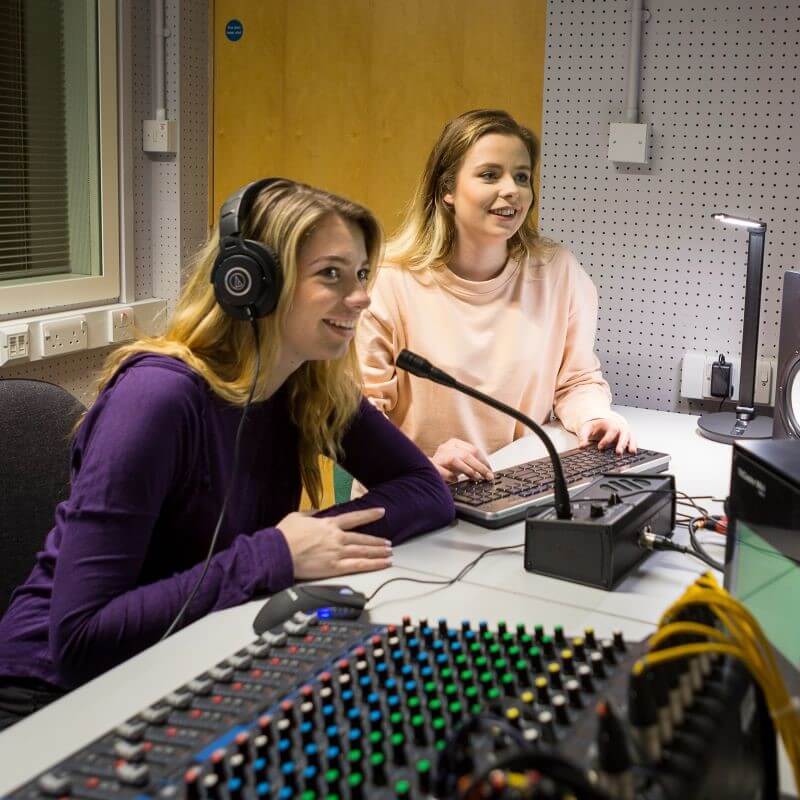
The Student Futures team is here to support you throughout your time at Roehampton and beyond.
They offer services tailored to your needs, helping you take confident steps towards your future.
You’ll have access to a wide range of career workshops and events, where you can engage with employers and develop the skills you need to succeed in the workplace.
These opportunities will help you build your CV, prepare for interviews, and connect with successful Roehampton graduates who are thriving in their careers. You’ll also be able to engage with our partners across London and beyond.
Wherever you want to go in the future, you'll be preparing for the world of work from your very first day.
Learning and assessment
How you'll learn
Your lectures, seminars and workshops will replicate the real-life situations and projects you can expect to face in a changing global creative industry landscape.
Get ready to:
- Work with your fellow students as a team on industry tasks
- Progress through each academic year by working on different projects and portfolios, from simple news stories to a whole magazine or multimedia packages
- Study in our computer rooms, modelled after media newsrooms
- Learn about the exciting world of literature
- Master the art of delivering compelling stories, utilising industry-standard digital tools
- In your final year, develop a multimedia magazine or create an audio-visual web project.
Learn through:
- Hands-on workshops, with professionals
- Lectures
- Seminars
- Skills sessions
- Assessment support sessions
- On-site tutorials.
Why did our past students study BA English Literature and BA Journalism at the University of Roehampton?
“The reason why I chose to study English literature specifically at Roehampton was down to the teaching staff I met at the time and also the positive feedback I got on open days from other students. The best thing about studying at Roehampton was the support I had from amazing lecturers. Everyone was so approachable and I never felt that I couldn’t just go and knock on a door for help.” - Saara Ismail Mahomed, BA English Literature
“I knew the standard of teaching was very high. The principal reason I chose Roehampton over other London universities […] was that the programme and its component modules sounded infinitely more interesting than programmes and modules offered anywhere else.” - Katherine Farquharson, BA English Literature
"Lecturers are very attentive to what the students need. At the same time, they give you a real sense of what journalism is. In the first year we were assigned to find a public figure to interview. That made a real impact and showed me what the industry would be like." - Vania Caetano Ascensao, Journalism
How you'll be assessed
You'll graduate university with a portfolio that demonstrates to employers your written, spoken, and digital skills.
This includes:
- Close reading exercises
- Reviews and blog posts
- Essays and interviews
- Media content creation, including:
- Features
- Podcasts
- Videos
- Multimedia packages
- Social media content
- Magazines
English Literature ranked 1st in London for Learning Resources
National Student Survey 2024

Open days
Get a real taste of our campus, community and what it’s like to study at Roehampton
Applying
Full-time UK undergraduate students apply through UCAS.
Entry tariff
112–128 UCAS points (or equivalent)
Foundation Year: 64–80 UCAS points (or equivalent)
Looking to work out your UCAS points or find out about our entry requirements? Find out more.
When we consider applications to study with us, we form a complete view of your achievements to date, and future potential, and can offer flexibility in entry requirements. Find out more about our Contextual Offer scheme.
General entry requirements
International undergraduate students apply through our direct application system.
Entry tariff
112–128 UCAS points (or equivalent)
International Foundation Pathway:
64 UCAS (or equivalent)
IELTS: 5.5
Looking to work out your UCAS points or find out about our entry requirements? Find out more.
When we consider applications to study with us, we form a complete view of your achievements to date, and future potential, and can offer flexibility in entry requirements. Find out more about our Contextual Offer scheme.
General entry requirements
Fees and funding
UK students
Tuition fees
| Entry date | Undergraduate Year 1 | Undergraduate Foundation Year |
|---|---|---|
| September 2026 | £9,790 | £TBC |
Prices shown are for the first year of your degree.
Funding your studies
We also provide other ways to support the cost of living, including on-campus car parking, hardship support and some of the most affordable student accommodation and catering in London.
International students
Tuition fees
| Entry date | Undergraduate Year 1 | Undergraduate Foundation Year | International Foundation Pathway |
|---|---|---|---|
| September 2026 | £17,628 | £17,628 | £17,628 |
| January 2027 | – | – | £17,628 |
Prices shown are for the first year of your degree.
Funding your studies
We also provide other ways to support the cost of living, including on-campus car parking, hardship support and some of the most affordable student accommodation and catering in London.



